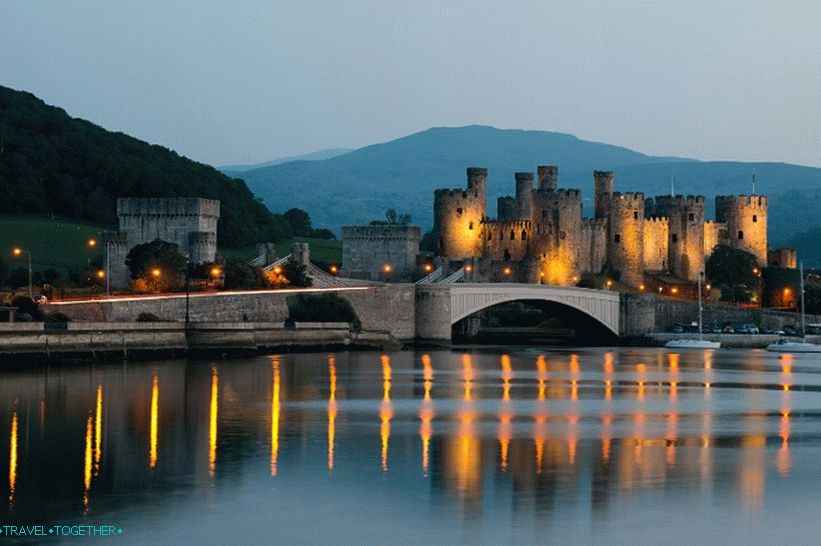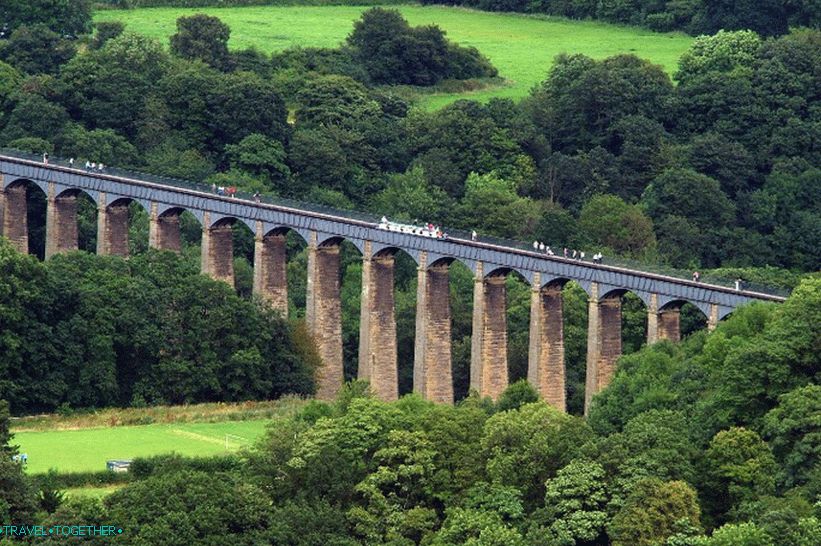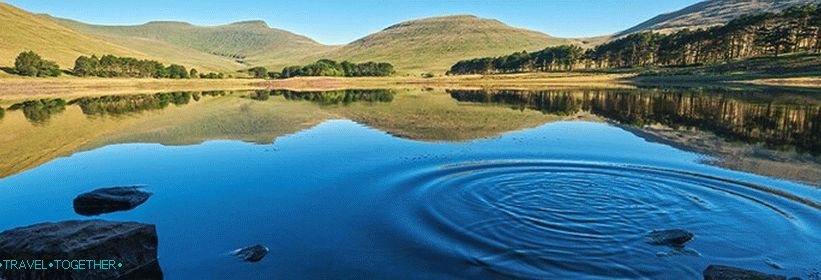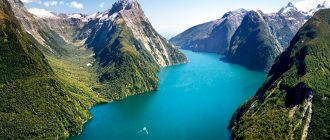Wales – the most detailed information about the country with a photo. Attractions, cities of Wales, climate, geography, population and culture.
Contents
Wales or Cymru
Wales is a country in the southwest of the UK which is administrative part of the United Kingdom. Bordered by east from England, from three sides is surrounded by waters The Atlantic Ocean (Gulf of Bristol in the south, the Strait of George in the south-west and the Irish Sea in the north-west). Wales – the smallest of the administrative-political units of the island UK which has its own character, culture and Lifestyle.
Wales is a region with a rich history and amazing natural beauty The country has an authentic Celtic culture that different from the culture of England and Scotland. Wales attracts many tourists wonderful castles and stunning scenery mountains and the sea coast.
 Wales flag
Wales flag
- Useful information
- Geography and nature
- Climate
- Best time to visit
- Story
- Administrative division
- Transport
- Cities of Wales
- sights
- Accommodation
- Kitchen
Useful information about Wales
- The population is more than 3 million people.
- Area – 20 779 km ².
- Currency – pound sterling.
- Language – English and Welsh.
- Time – UTC 0, in the summer +1.
- The UK is not a party to the Schengen Agreement. Visa can be obtained by personally visiting an accredited visa centers that are located in Moscow, Novosibirsk, St. Petersburg, Rostov-on-Don and Yekaterinburg.
- Wales is one of the safest areas of the United Kingdom The most dangerous are unheated spirits Welsh (especially after sporting events). Although tourists are very rarely the target of their aggression.
Geography and nature
Wales is predominantly a mountainous country that occupies southwestern part of the island of the UK. Has land borders with England and more than 1 000 km of sea coast, off the coast of which there are several dozen islands. The most populated south Wales, where the largest cities are located. In North-west The mountain range of Snowdonia is located where the highest the point of Wales is Mount Snowdon (1085 m). In the south lies a mountain range Brecon Beacons, and in the central part – the Cambrian mountains.
 Wales Mountains
Wales Mountains
Wales wildlife is typical of Britain. Although there are some the differences. Due to the long coastline in Wales, many birds colonies. There are almost no large mammals in Britain. In Wales preserved wild goats, weasel, ermine, otter, marten. Welsh rivers and seas are rich in fish.
Climate
The climate of Wales is temperate maritime. It is characterized usually mild, windy and wet weather. During the year prevail westerly winds. The rainiest period is from October to January. In the mountains the climate is a bit harsher.
 Wales
Wales
Best time to visit
The best time to visit Wales is from May to September. AT this time is quite warm, and a long daylight day will allow you to cover all to the maximum. The highest season is July and August.
Story
The first written testimonies about Wales date back to the Roman an era. At the time, the west of Britain was inhabited by Celtic tribes (Ordovics and Silurians were the most numerous). Romans built there are several forts and fortresses. In the 5th century the Roman Empire came in decline. The Romans left the territory of Britain. At the beginning of the 5th century on the territory of modern Wales lived by the Britons, who united in several small kingdoms. In the early Middle Ages the Welsh crowded the Anglo-Saxons, whose kingdom in the 8th century built on border with Wales earthen wall. It was during this period that began. the birth of Welsh culture and national consciousness.
The name of the country comes from the English. the words “Wales”, which, most likely derived from the name of the Celtic tribes (wolves). Welsh name of the country – Cymru, which translates from the language of Britons as “compatriots”.
 Coastline wales
Coastline wales
In the 11th century (after the Normans conquered Britain), Wales became gradually go under the authority of the English crown. At the end of the 13th century the British finally conquered his whole territory. Thereafter they built several powerful castles here. Wales was finally integrated into the English kingdom in the 16th century and since then its history was inextricably linked with the history of England.
Before the industrial revolution, Wales was a sparsely populated country most of the population was engaged in agriculture. However, coal deposits and the construction of industrial facilities in its south was the cause of the rapid growth of the economy and population. B 18 – 19 For centuries, Wales has become an important industrial region. And his the largest cities (Cardiff and Swansea) are among the centers of the Western Great Britain.
 Swansea
Swansea
Administrative division
The territory of Wales is divided into 22 districts, among which 9 counties, 3 cities with city status, and 10 county cities.
Regionally, Wales can be divided into three regions:
- North Wales – mountainous terrain with provincial rural areas.
- Middle Wales is a sparsely populated region of mountains, moorlands, forests, wide river valleys and the sea coast.
- South Wales is the most urbanized region with amazing seascapes.
 Coastline wales
Coastline wales
Transport
The main airport is located in Cardiff. He has a regular communication with other cities in Britain and some major cities of Europe. To get to South Wales you can take advantage of Bristol Airport, in Central Wales – Birmingega, in North Wales – Liverpool or Manchester. Capital Wales is connected by rail with London and other major cities of England.
Cities of Wales
 Cardiff
Cardiff
- Cardiff is the capital and largest city of Wales, as well as the largest tourist, cultural and industrial center of the West Great Britain.
- Swansea is Wales’ second largest city and largest port.
- Aberystwyth – a university town in the county Ceredigion.
- Carnarvon – a historic city with a well-preserved medieval castle.
- Conwy is another Welsh town with an impressive medieval castle.
- Llandudno is the largest resort in North Wales.
- Wrexham is the largest city in North Wales.
Wales Attractions
 Cathedral of sv. David
Cathedral of sv. David
Cathedral of sv. David – a magnificent medieval gothic temple, founded in the 12th century and dedicated to the patron saint Wales
 Conwy
Conwy
Conwy is an impressive medieval castle in beautiful Snowdonia. This powerful fortress was founded in 1283 at the mouth of the eponymous rivers.
 Carnarvon
Carnarvon
Carnarvon is a massive castle with 13 towers and two gates, which is considered one of the most impressive and well surviving medieval fortresses in Europe. The castle was founded in 13 century and is one of the largest among these buildings. Britain
 Aqueduct and canal Llangollen
Aqueduct and canal Llangollen
The aqueduct and channel Llangollen – a great example of civil construction and engineering included in the list of World UNESCO heritage. It is an 18-arched bridge built of stone and cast iron, which crosses the valley of the river Di.
 Snowdonia
Snowdonia
Snowdonia – a beautiful ridge of low mountains and hills, which considered one of the most beautiful places in Britain.
 Brecon Beacons
Brecon Beacons
Brecon Beacons – a national park and one of the most beautiful parts of Wales, known for wild ponies and mountains of red sandstone.
 Pembrokeshire
Pembrokeshire
Pembrokeshire – the coast of the peninsula of the same name, which It is washed by the Irish Sea. This place is famous for its picturesque cliffs, pretty fishing harbors and villages.
Accommodation
Wales is quite popular among tourists due to the beautiful nature. Looking for housing (if you do this in advance) should not be problems. In rural areas, small hotels are combined with pubs
Kitchen
Welsh cuisine is simple and does not cause any association with some particular dish. Popular traditional food:
- Roast lamb served with mint sauce and vegetables.
- Cawl – lamb broth.
- Bara brith – sweet bread with dried fruits.
- Welsh Rarebit is a melted cheese dish seasoned with onions, ale and herbs served in toasted bread.
- Laverbread – seaweed tortillas.
 Wales
Wales
Wales is known for high-quality whiskey, excellent beer and apple cider






